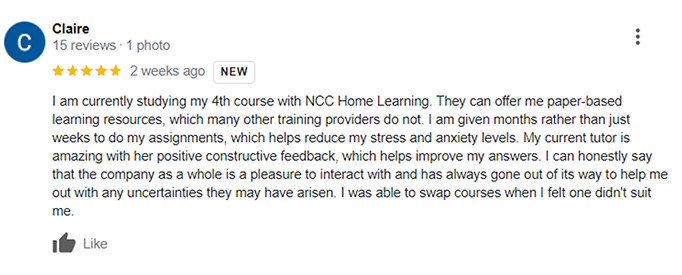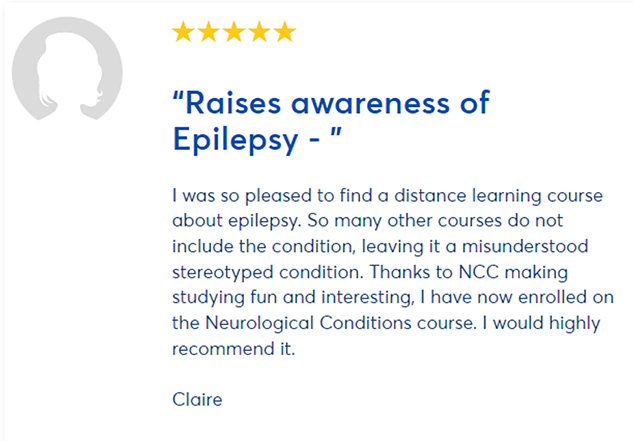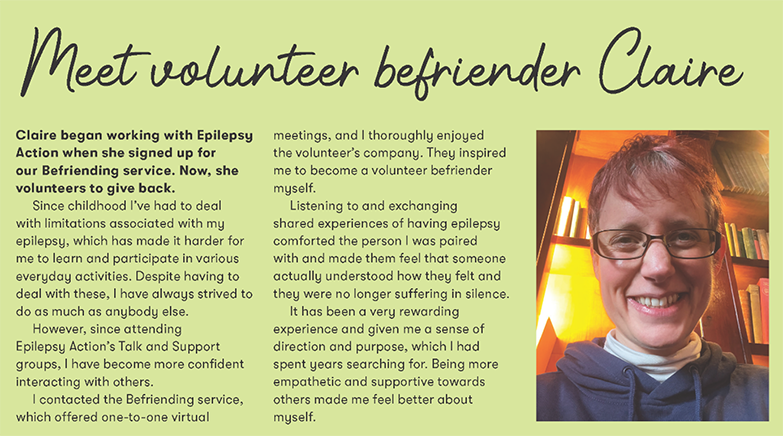Celebrating our learners’ achievements

At NCC, we take pride in our learners’ achievements, and we’re particularly thrilled to see how one learner has applied her educational journey to give back through volunteering. It’s truly inspiring to witness the impact she’s making, especially in her support for Epilepsy Action, a charity close to her heart. We wholeheartedly celebrate her dedication and the invaluable contribution she’s making to both her own growth and the welfare of others, alongside recognising the commendable efforts of Epilepsy Action.
Claire approached us following extensive research. She expressed her desire to undergo formal training in Understanding Epilepsy, aiming to attain an endorsed qualification along with a certificate as proof of her training. Claire is aware that while an endorsed qualification isn’t regulated, it can still serve as valuable evidence of acquired knowledge, potentially aiding in securing a spot in higher education. We’ve seen numerous learners utilise their endorsed qualifications from NCC to successfully gain admission to university.
Meet Claire an NCC learner

“I have learned about different people in society by studying courses online. Understanding people’s differences and learning how to adapt when interacting with them, can help eliminate the stereotypes and myths about different mental health conditions, neurological conditions, learning disabilities or specific learning difficulties and help remove any unnecessary anxieties that may be caused by misunderstanding. The more disability is shown in society, the more normal and accepted it can become. If people with disabilities separate themselves from the rest of society they become segregated, their conditions will remain stereotyped and misunderstood. NCC’s courses about Neurological Conditions and Understanding Epilepsy have been extremely interesting for me personally.
Understanding Epilepsy
Epilepsy is a neurological condition that today is still unfortunately too often stereotyped and doesn’t get enough awareness. Charities such as Epilepsy Action attempt to fill the gaps left by other services. The befriending service is led by trained volunteers who give up their spare time to support those who seek emotional support for whom traditional counselling or Cognitive Behavioural Therapy doesn’t work. Sharing experiences of having epilepsy can help someone feel more connected and understood. Befriending has given me a sense of purpose and direction, which has improved my mental wellbeing dramatically. Knowing that I have improved another person’s day purely by keeping them company for 30-45mins on the phone or video call is so rewarding. Being able to change my epilepsy from a negative experience into something positive has been made easier by Epilepsy Action’s volunteering opportunities, which I am always grateful for.
I am now studying QLS Level 2 Introduction to Counselling, in which I have learnt about listening skills and the advantages and disadvantages of different types of counselling and which has also been interesting and useful for my befriending role at Epilepsy Action. I am now wondering what future courses may be able to improve my skills even further. I do have an add-on course lined up called CPD Acquired Brain Injuries, which should complement the other courses well. I have come to the conclusion that I am naturally closer to a supporting, advisory role than a counselling, coaching role.”
Claire’s reviews
Claire has kindly provided a Google 5-star review of her experience with NCC:

NCC was the only distance learning company she could find offering a course designed for Epilepsy, an area frequently overlooked in disability training. Our collaboration with NCFE, a prestigious Awarding Organisation boasting over 150 years of educational support, enabled us to develop this specialised course.
This is what Claire had to say about studying “Understanding Epilepsy” with NCC:

The Benefits of Volunteering with Epilepsy Action
Volunteering alongside Epilepsy Action not only brings about positive change in the lives of individuals but also serves as a catalyst for personal development and overall well-being. According to their recent survey, an overwhelming 83% of volunteers reported feelings of personal accomplishment, heightened confidence, and fulfilment in their respective roles. For example, a research volunteer underscored how volunteering fosters a sense of belonging, bolsters confidence, and expands knowledge. Similarly, a Talk and Support Group volunteer emphasised the increase in self-assurance and skills as a direct result of their impactful contributions.
Additionally, numerous volunteers expressed that their involvement in volunteering activities is empowering and contributes significantly to their sense of self-value.
Volunteering offers avenues for skill development, meeting new people, and enhancing wellbeing. The diverse range of roles caters to various interests, schedules, and availabilities, whether it’s one-to-one support, group assistance, campaign involvement, or online awareness initiatives.
In addition to the personal benefits, Epilepsy Action is committed to supporting volunteers throughout their journey, ensuring they have the necessary resources to excel in their roles.

In today’s world, being a volunteer is really important for making society better. Whether it’s helping out locally or dealing with big global problems, volunteering is key. But it’s not just about lending a hand; it’s also about growing personally and learning new things. With online learning becoming more popular, people can use the internet to learn new skills, which can make their volunteering efforts even more effective.
Online Learning: Helping People Learn New Skills
Online learning has changed education a lot by offering loads of different courses on lots of topics. Whether you want to get better at technical stuff like coding or improve your communication and leadership skills, there’s a course for you. The great thing about online learning is that you can do it at your own pace, from anywhere, and fit it around your other commitments. Plus, there are different ways to learn, like watching videos, doing quizzes, or joining discussions.
Popular NCC Courses
Learning Skills for Volunteering
Online learning helps volunteers learn specific skills they need for their roles:
- Technical Skills: Knowing about technical stuff is important for many volunteering projects, like making websites or analysing data. Online courses in programming, web development, and design can help volunteers become experts.
- Communication and Leadership: Good communication and leadership are crucial for volunteering. Courses on speaking in public, solving problems, and managing teams teach volunteers how to express themselves, work with others, and lead projects.
- Understanding Different Cultures: In a diverse world, it’s important to understand different cultures when volunteering. Online courses on cultural diversity and inclusion help volunteers connect respectfully with different communities.
- Disability Awareness: Knowing about disabilities helps volunteers include everyone. Disability training teaches volunteers how to accommodate different disabilities and be respectful and understanding. This makes volunteering opportunities open to everyone and makes the experience better for both volunteers and those they help.
- Project Management: Being good at managing projects is important for successful volunteering. Online courses teach volunteers the skills they need to plan and carry out projects effectively.
When volunteers combine this extra training with their hands-on experience, it can really help them in their careers and open up more opportunities.
Making a Difference through Volunteering
By using online learning, volunteers can learn skills that make a real impact. Whether they care about protecting the environment or fighting for fairness, online learning helps volunteers connect with communities and make positive changes. Well-trained volunteers also make volunteering projects more successful, which leads to lasting change and a better society for everyone.
Online learning is a powerful way to improve volunteering and create social change. By learning new skills through online courses, volunteers become better at what they do and can tackle important issues, making the world a better place. Let’s use online learning to support volunteers and make our communities stronger.
The Impact of Disability Awareness in the Wider Community
Every day, individuals with disabilities that are not immediately visible often face the challenge of dealing with misconceptions and discrimination. This was highlighted in a recent article I came across, where a person with cerebral palsy was mistaken for being intoxicated. However, by fostering greater awareness and understanding of disabilities, La Quinta management has set a remarkable example of what inclusivity can achieve. Their efforts have not only created a welcoming environment for members of the community with disabilities, significantly enhancing their mental health and well-being, but it also undoubtedly benefits their business. Building a more inclusive community can only lead to positive outcomes.
The article in question is: The Essex restaurant that transforms into a nightclub for people with disabilities every week
This article and its content have been approved by the charity Epilepsy Action









